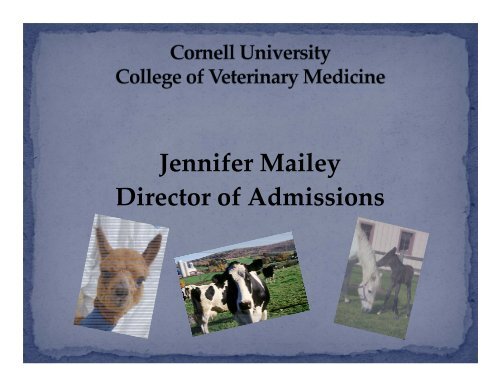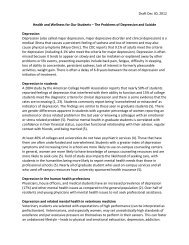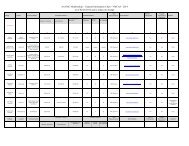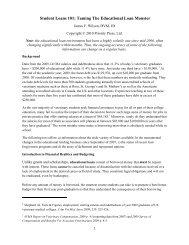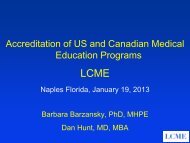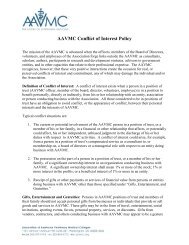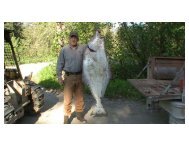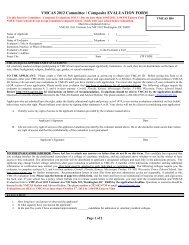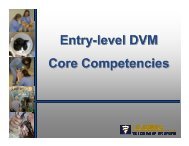Jennifer Mailey Director of Admissions - Association of American ...
Jennifer Mailey Director of Admissions - Association of American ...
Jennifer Mailey Director of Admissions - Association of American ...
- No tags were found...
You also want an ePaper? Increase the reach of your titles
YUMPU automatically turns print PDFs into web optimized ePapers that Google loves.
Who Are You?
How to Prepare~• Educational preparation, major, course load,course choice, rigor <strong>of</strong> curriculum, lab sciencestogether, full‐time load, honors program, etc.• Prerequisite courses• Veterinary Experiences• Animal Experiences• Research• Extra‐curricular & Co‐curricular experiences
Choosing an Undergraduate MajorCornell Class <strong>of</strong> 2015Sample <strong>of</strong> MajorsAnimal Science SpanishBiologyPolitical ScienceBusinessBiochemistryForestryEngineeringPsychologyEnglishReligion
Undergraduate Students• Take a rigorous curriculum• Take a full‐time load; avoid withdrawing fromcoursework• Keep your GPA up; take courses for letter grades, notpass/fail (especially your prerequisite courses)• Get Involved! Opportunities in leadership, extracurricular& co‐curricular activities are valued• Note, AP credit may only count for certain prerec courses• Reminder‐ some colleges do not require a bachelorsdegree (only 60‐90 credits)
TotalAUBUCDCSUCORUFLUGAUILISUKSULSUMSUUMNMSSUMOMELNCSOHSOKSORSUPAPURTUFUTNVMRWESWSUWISDUBEDIGLAPEIGUEMASMURROYPhysics X X X X X X X X X X X X X X X X X X X X X X X X X X X X X X X X 32Biochemistry X X X X X X X X X X X X X X X X X X X R X X X X X X X X X X X X 32Biology/Zoology X X X X X X X X X X X X X X X X X X X X X X X X X X X X X X X X 32Inorganic Chemistry X X X X X X X X X X X X X X X X X X X X X X X X X X X X R 29Organic Chemistry X X X X X X X X X X X X X X X X X X X X X X X X X X X X X 29Mathematics/Statistics X X X X X X X X X X X X X X X X R X X X X X X X X X X 27English Composition X X X X X X X X X X X X X X X X X X X X X X X X X X X 27Humanities/Social Sciences X X X X X X X X X X X X X X X X X X X X X X X X X X 26Genetics X X X R R X X X X X X X X X X X X X X X X 21Microbiology X X R R X X X X X X X X R X R X R X X 19Electives X X X X X X X X X X X X X 13Speech/Public Speaking R X X X X X X X X X 10Science Electives X R X X X X R R R R 10Cellular Biology R X X R X X X X 8Physiology (Systemic) X R X X R X R 7Nutrition X X X X X X 6Animal Science X 1117 (75 S)83 Q (55 S)60 S90 S79 S63 S62 S60 S64 S66 S57 SVariable79 S60 SVariable59-6196 Q64 S 6variable90 S69-86 S6066 S60 S54 S6460 Svariablevariable60 S60 Snotevariable70 SvariableTotal Credits/Hours required(S, Q,or X)NoNoNoNoNoNoNoNoNoNoNoNoNoNoYesNoNoNoNoNoNoNoNoNoNoNoNoYesNoNoNoNoNoNoYesBachelor's Degree Required
Prerequisite CoursesCOR –Cornell UniversityCourses (Semester Hours)• Physics with laboratory (full year) (6)AP credit <strong>of</strong> 4 or higher allowed.• Biochemistry (half year required, full year preferred) (4)• Biology or zoology with laboratory (full year) (6)• General chemistry with laboratory (full year) (6)AP credit <strong>of</strong> 4 or higher allowed.• Organic chemistry with laboratory (full year) (6)• English composition and literature (full year) (6)Three credits <strong>of</strong> literature may be satisfied by a coursein public speaking.• Microbiology with laboratory (3)• Elective (53)Total semester credits 90
Cornell UniversityPrerequisite College CoursesAdditional criteria:• 12 credits may be in progress when applying• Junior/Senior level courses are encouraged• Must earn C‐ or higher• AP accepted for General Chemistry & Physics (score <strong>of</strong> 4or higher)• Prerequisite Substitution option
Gain Veterinary Experience~• 300‐400 hours• Minimally one letter from a veterinarian• Small animal and/or large animal experience(bovine/equine)• Other veterinary experiences: zoo, wildlife, exotics,lab animal medicine• Breadth <strong>of</strong> experience with other species
Where to find animal experiences~• Zoo’s‐ internships and volunteer opportunities;• Wildlife Centers‐ assist in care, capture, release;• Humane Society’s‐ cleaning cages, walking dogs,socializing animals, assisting in adoptions;• Stables‐ cleaning out stalls, grooming horses,riding lessons;• Farms‐ feeding animals, milking cows;• Sanctuaryʹs‐ assisting in care <strong>of</strong> animals
• Look for a solid college or university to do post‐bac work• Some colleges <strong>of</strong>fer a post‐bac (pre‐med or pre‐vet)formal program• Sciences are sequential, so it can take 4 semesters (2years) to complete all prerequisite courses• Try to take some lab sciences together• Important to have veterinary and animal experiences, sothis extra time taking classes can be a benefit• Some Vet Colleges prefer to see course work under 10years
Consider:• Curriculum• Clinical Experiences• Location• Research Opportunities• Externship Opportunities• Faculty• Your Learning Style• Student Life (Organizations &Extra/co‐curricular activities)
• Teaching Style:• Small Group Learning• Lectures• Labs• Individual Study• Faculty involved in teaching and learning• Access to hospitals and cases
• Tutorial sessions• Small group learning• Case‐based exercises‐ promotes integration <strong>of</strong>basic and clinical sciences• Students actively involved in learning• Develop skills in communication, informationresearch, and analysis <strong>of</strong> information• Fosters critical thinking, scientificcuriosity, problem‐solvingand self‐education
• Small Animal: SA S<strong>of</strong>t Tissue Surgery; SA Medicine; Anesthesia;Imaging; SA E/CC; SA Ortho Surgery; Cardiology; Oncology• Equine: LA Medicine; LA S<strong>of</strong>t Tissue Surgery; Anesthesia; Imaging; SAE/CC; LA Ortho. Surgery; Therio; Equine Specialty• General (Mixed): SA Medicine; LA Medicine; Anesthesia; Ambulatory;SA Ortho. Surgery; LA Ortho. Surgery; Cardiology or Oncology;Community Practice Service• Exotics: SA Medicine; SA S<strong>of</strong>t Tissue Surgery; Anesthesia; SA Ortho.Surgery; Oncology; Lab Animal Med.; Exotics/Zoo (2 blocks)• Zoo & Wildlife: SA Medicine; LA Medicine; Oncology; Lab AnimalMed.; Therio; Exotics/Zoo (3 blocks)• Production Animal: Ambulatory (2 blocks); LA Medicine; LA S<strong>of</strong>tTissue Surgery; Pathology; Quality Milk; Therio; CPS Med.
• Dual DVM/PhD Programhttp://www.vet.cornell.edu/OGE/DualDegree/• For students interested pursuing careers in(biomedical) research, academic leadership, andteaching• 7 year program leading to the DVM & PhD degrees• Integrates Cornell’s veterinary & graduatecurriculum• Advantage: allows students to completedegree requirements in approximately 1.5years less time than typically required
• Veterinary Investigator Programhttp://www.vet.cornell.edu/oge/investigator/• Provide first and second year Cornell vet students• Intense summer research experience• Intended to lead to a sustained interest in research andacademic medicine• Includes research round‐table discussion, weekly seminarson current and emerging research techniques, grantwriting, scientific ethics, field trips
• The Summer Dairy Institutehttp://www.vet.cornell.edu/summerdairyinstitute/6‐week course; up to 24 participants; competitiveapplicationPr<strong>of</strong>essional information on subjects such as:• Reproduction• Nutrition• Dairy facilities• Dairy Record Systems• Biosecurity• Public Health& Regulatory Considerations• Financial Decision Making
• Leadership Programhttp://www.vet.cornell.edu/OGE/Leadership/• Summer learning experience for veterinary studentsinterested in research• Approximately 25 veterinary students from US and abroad• Intensive, research‐oriented initiative• Combines faculty guided research with vocationalcounseling, student directed learning and otherpr<strong>of</strong>essional enrichment activities
• AQUAVEThttp://www.vet.cornell.edu/aquavet/• Offers a unique & exciting opportunity to work in the area<strong>of</strong> aquatic animal research and medicine• Research projects through 8 weeks during summer• Sponsored by veterinary colleges at Cornell and Univ. <strong>of</strong>Penn in collaboration with 3 marine science institutions inBristol, RI
• Student Chapter <strong>of</strong> the <strong>American</strong> Veterinary Medical <strong>Association</strong>(SCAVMA)• <strong>American</strong> <strong>Association</strong> <strong>of</strong> Bovine Practitioners• <strong>American</strong> <strong>Association</strong> <strong>of</strong> Equine Practitioners• Feline Club• Canine Club• Veterinary Student for the Prevention <strong>of</strong> Cruelty to Animals• <strong>American</strong> <strong>Association</strong> <strong>of</strong> Small Animal Ruminant Practitioners• Zoo and Wildlife Society• International <strong>Association</strong> <strong>of</strong> Aquatic Animal Medicine• Student Chapter <strong>of</strong> the Veterinary Emergency & Critical Care Society• The Pet Loss Support Hotline• Cornell Companions
• Veterinarians Internationally Developing Animal Health• Veterinary Students One In Ethnicity and Color• Vets for Diversity• UltraSound• The Cornell Veterinary Players• Phi Zeta• Omega Tau Sigma• Southside Community Center• The Cornell Raptor Program• Veterinary Business Management <strong>Association</strong>• Students for Animal Interests and Veterinary Ethics• Open House~ Saturday, April 14, 2012 from 10:00‐4:00
• VMCAS~ centralized application program forparticipating Veterinary Medical Colleges• Link to Sample Application:http://www.aavmc.org/data/files/vmcas/sampleapp2011.pdf• 25 U.S. Veterinary Medical Colleges participate inVMCAS, along with two Canadian Veterinary MedicalColleges, and international institutions
Auburn UniversityUniversity <strong>of</strong> California‐ DavisColorado State UniversityCornell UniversityUniversity College <strong>of</strong> DublinUniversity <strong>of</strong> FloridaUniversity <strong>of</strong> GeorgiaUniversity <strong>of</strong> Illinois‐UrbanaIowa State UniversityKansas State UniversityLouisiana State UniversityMassey UniversityMichigan State UniversityUniversity <strong>of</strong> MinnesotaMississippi State UniversityUniversity <strong>of</strong> MissouriMurdoch UniversityUniversity <strong>of</strong> EdinburghNorth Carolina State UniversityOhio State UniversityOklahoma State UniversityOregon State UniversityUniversity <strong>of</strong> PennsylvaniaPurdue UniversityUniversity <strong>of</strong> TennesseeVirginia‐Maryland Regional CollegeWashington State UniversityUniversity <strong>of</strong> WisconsinUniversity <strong>of</strong> GlasgowUniversity <strong>of</strong> GuelphUniversity <strong>of</strong> Prince Edward IslandWestern UniversityRoyal Veterinary College
1=$1592=$2203=$2804=$3425=$4506=$5577=$6578=$7639=$86610=$96511=$1,07212=$1,17213=$1,27314=$1,38315=$1,48716=$1,58817=$1,68918=$1,79619=$1,89520=$2,00521=$2,10422=$2,21123=$2,31324=$2,41325=$2,52126=$2,62827=$2,72727=$2,83529=$2,94230=$3,04831=$3,15432=$3,25433=$3,357
• Veterinary Medical Application Service (VMCAS)http://www.aavmc.org/Students‐Applicants‐and‐Advisors/Veterinary‐Medical‐College‐Application‐Service.aspx• June‐October 2, 2012• Electronic Letters <strong>of</strong> Reference (eLor’s)‐ 3 required tocomplete your application (deadline October 2, 2012
Evaluations:• Register a minimum <strong>of</strong> three evaluators in the eLOR section• Verify that your evaluators have received the e‐mail requestand have submitted your evaluation by 1:00 PM Eastern Time,Monday, October 2nd, 2012.• VMCAS requires electronic evaluations with exception <strong>of</strong>committee and composite letters (note some schools will notaccept committee/composite letters).• Verify that your evaluations have been received by VMCASfrom www.aavmc.org
Other Application Materials:• Send transcripts and test scores directly to your designated collegeprior to the deadline.• Visit the web site for each designated college to obtaincollege‐specific instructions.• Complete any supplemental applications <strong>of</strong> requiredAAVMC Chart with Specific Vet College Information:http://www.aavmc.org/data/files/vmcas/general%20school%20info%20chart_2012_final.pdf•
Supplemental Applications• Some colleges have a Supplemental or Part II Applicationhttp://www.aavmc.org/College‐Specific‐Requirements/College‐Specific‐Requirements_Supplemental‐Information.aspx• Make sure you review the web sites <strong>of</strong> the colleges forapplication instructions• Supplemental Application deadlines may vary
Example <strong>of</strong> Supporting Documents sent directly to thecolleges:• Additional letters <strong>of</strong> evaluation• Official college transcripts sent directly from thecollege or university• Official GRE or MCAT Scores• AP Scores for Chemistry or Physics only• TOEFL Scores• Dean’s Certification• Residency Form (NY)
Requirements and Considerations:• Veterinary and Animal Experiences• Evaluations• Extracurricular and community service• VMCAS Personal Statement• Other written Statements• Interview• GPA• Test Scores
25% All Grades from All Colleges25% GRE or MCAT Test Percentiles5% Quality <strong>of</strong> Academic Programone academic advisor’s letter20% Animal/Veterinary/Research Experiencewith Letters <strong>of</strong> Evaluation10% Non‐Cognitive Skills10% All Other Achievements5% Personal Statements
Veterinary MedicineSchool AdmissionRequirements~ VMSAR ~http://www.thepress.purdue.edu/titles/format/9781557536167
• Class size varies for different Vet Colleges• In‐state and out‐<strong>of</strong>‐state seats• Range from 56‐150 in a class• OOS seats can be as few as 3% and as many as 67% <strong>of</strong>the class• In state and out <strong>of</strong> state tuition will also vary
Cornell College <strong>of</strong> Veterinary Medicine~Class <strong>of</strong> 102 students~• 250‐300 NY application for approximately 55 NYseats• 650‐700 Non‐NY applications for approximately47 non‐NY seats
Link to some options for assistance~http://www.aavmc.org/Students‐Applicants‐and‐Advisors/Get‐Help‐Paying‐for‐a‐Veterinary‐Medical‐Education.aspx• Animal Health Student Scholarship• scholarship from the Winn Feline Foundation• Veterinary Medical Loan Repayment Program (VMLRP)• Harold Wetterberg Foundation Veterinary Medicine ScholarshipProgram• The Winner's Circle Scholarship Program
Many vet colleges will use the following forms:• Free Application for Federal Student Aid(FAFSA) www.fafsa.ed.gov• CSS PROFILE Applicationwww.collegeboard.com
• Typical Financial Aid Package at Cornell:• 59% Student Loans(Health Pr<strong>of</strong>essions Student Loans, Federal Perkins Loans,Unsubsidized Loans, Grad Plus Loans, External Loans)• 19% Gift Aid(grants, scholarships and fellowships)• 20% Self‐Help(student earnings and parental contributions)• 2% Outside Gift Aid(state grants and private scholarships)~Merit and Need Base Scholarships~
• Clinical Practice• Private Practice or Corporate Practice• Small Animal Practice: dogs, cats, birds, small mammals,reptiles, fish• Large Animal Practice: Horses and/or farm animals• Mixed/General Practice: Combination <strong>of</strong> the above
• Public Health• Investigating animal and human disease• Examples food‐borne illnesses, West Nile disease, rabies,influenza, etc.• Work at USFDA, Environmental Protection Agency,Department <strong>of</strong> Homeland Security, Centers for DiseaseControl & Prevention, National Institute <strong>of</strong> Health (NIH)• Cornell: Dual Degree DVM/MPH with the University <strong>of</strong>Minnesota
• Regulatory Medicine• State & federal regulatory agencies• Prevent foreign diseases coming into US, ensure healthyanimals enter food supply, animal care, research• US Department <strong>of</strong> Agriculture
• Research & Teaching• Faculty at colleges and universities• Teach through classroom and clinical experiences• Research at universities, government agencies, corporate• Research can associate with disease, treatments andmethods/procedures
• Other• Lab Animal Medicine• Aquatic Animal Medicine• Zoo Medicine• Shelter Medicine• Wildlife Medicine• Military• Government• Business and industryFor more information about careers in veterinary medicinevisit http://www.avma.org/careers/default.asp
• Manage food‐production animals at sites such as3,000 milking cow dairy farms• Prevent outbreaks <strong>of</strong> food‐borne illnesses byworking with government agencies to monitor foodprocessingplants• Monitor rabies outbreaks and other zoonoticdiseases for public health agencies such as the NYCHealth Department• Monitor animal health at places like the NewEngland Aquarium
• Experts in bioterrorism, working with agencies suchas the Philadelphia Health Department• Serve as Pathologists at zoos & animal parks, such asthe Bronx Zoo• Monitor and identify disease outbreaks in the US,such as West Nile virus• Work to conserve endangered species, such as themountain gorillas <strong>of</strong> Rwanda• Help establish and run <strong>of</strong>fices for nonpr<strong>of</strong>itorganizations working with animal issues, such asthe Humane Society <strong>of</strong> Ecuador• Run centers that rehabilitate wildlife
<strong>Jennifer</strong> <strong>Mailey</strong><strong>Director</strong> <strong>of</strong> <strong>Admissions</strong>Cornell UniversityCollege <strong>of</strong> Veterinary Medicinejam333@cornell.edu(607)253‐3702


